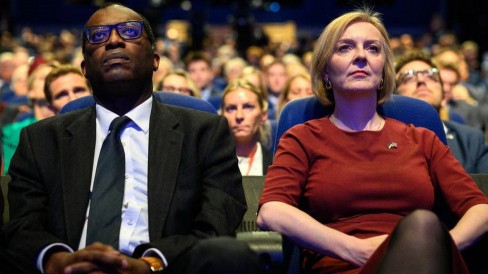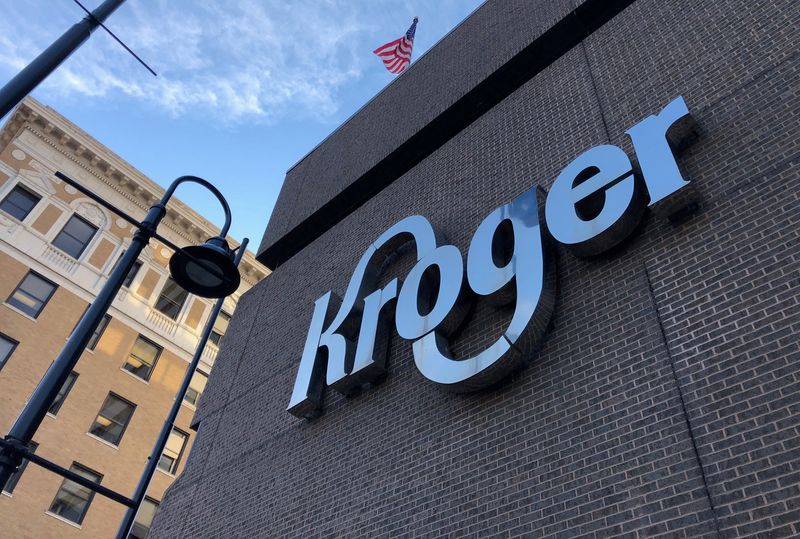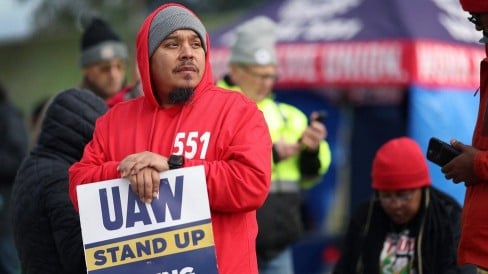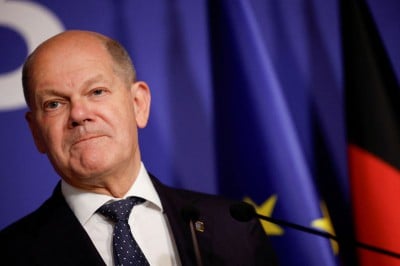
The term "mini budget" will be forever toxic in British politics.
So disastrous was then-Chancellor Kwasi Kwarteng's September 2022 statement - which included 拢45bn of unfunded tax cuts - that its long shadow still stretches over our economics and politics.
Over the past year, I have spoken to all the key players, some in public and some in private, about what happened both before and after that day.
Those conversations have revealed important new details about Mr Kwarteng and then-PM Liz Truss' "growth plan" - including that its initial impact was far worse than has been publicly known up to this point.
In the immediate aftermath, top officials were being asked by astounded counterparts how Britain had singlehandedly shifted one of the key indicators of the world economy in the financial markets, known as the Fed Fund futures curve. It was not a proud moment, they tell me.
In Washington for a key IMF meeting, Mr Kwarteng himself was privately having to reassure US bankers, politicians, and diplomats at the British embassy that the UK "was committed to fiscal responsibility" and that the Bank of England was one of the UK's "finest institutions".
That final comment attracted a lone clapper in the room - a board member of a British bank.
The chancellor went on to draw parallels between himself and Sir Isaac Newton, who held the high-ranking title of Warden of the Royal Mint for roughly 30 years. Bemused guests may not have realised that Sir Isaac himself made drastic attempts to reassert sterling's credibility in the late 17th Century.
As journalists in the room knew at the time, Mr Kwarteng was summoned back to Downing Street mid-meeting - but as he swept through the Washington DC rain he chafed at comparisons between himself and the crisis-ridden Greek Finance minister Evangelos Venizelos who had been hauled back from the IMF during the country's 2011 crisis.
As Mr Kwarteng rushed home, PM Liz Truss was being forced to take her own drastic action.
Off the back of the mini-budget, the Bank of England was about to cease its emergency purchases of government bonds - these are a form of debt that the government sells to raise money it needs for public spending. As a result, Ms Truss' team felt she had no choice but to U-turn on a corporation tax cut announced in the mini-budget.
- Liz Truss: I was never given realistic chance to enact tax cuts
- Kwasi Kwarteng says he got carried away as chancellor
The Bank's Governor Andrew Bailey tells me that this was not designed to pressure the government - but to ensure financial stability.
But Ms Truss says there were questions about the bank's governance - they were in a very powerful position over her and did effectively put "pressure on me and the government to reverse our decisions on taxes", she says.
Ms Truss says the same of another institution, the Office for Budget Responsibility, which is the country's official independent economic forecaster. It was created to help market confidence by ensuring a government's numbers are regularly checked. She says she had not realised the "sheer level of power an organisation like the OBR has" before she got to Downing Street.
The plan by Ms Truss and Mr Kwarteng was to bypass the OBR.
Its boss had worked through summer to prepare for an early set of tax changes and Mr Kwarteng had a draft forecast on his desk when he arrived in the job.
But as I revealed a week before the mini-budget, Downing Street refused to publish it.
The numbers, marked as "market sensitive", forecast the Truss administration borrowing an extra 拢110bn over five years as gas prices, inflation and interest rates surged.
The OBR chief executive Richard Hughes told me: "We were not asked to produce an updated forecast for him. And we were not asked to publish any forecasts alongside that [mini-budget]."
Current Chancellor Jeremy Hunt has said this was a fundamental error by Mr Kwarteng. If the OBR had provided a forecast alongside the mini-budget, Mr Kwarteng would have been forced to show how his 拢45bn in tax cuts would balanced with spending cuts or increased borrowing.
Instead, the mini-budget had a solitary table asserting how, theoretically, the gap could be filled if the economy grew faster.
It was the equivalent of trying to pay a restaurant bill with an Instagram photo of some gold bars.
Image source, Getty Images
In the mini-budget, as soon as the government revealed it needed an extra 拢72bn in funding from the markets - without details of how it calculated the number - the market reacted badly. It simply did not believe the plans.
Massive spending cuts might have bridged the gap - but both Ms Truss and Mr Kwarteng lacked both the clout and the numbers to push such plans through the Commons.
It was made worse by a crisis in a normally sleepy corner of the pensions system that is used to manage the risks of interest rate changes, which are normally predictable and gradual. Interest rates rises are normally good for pensions funds' long term health - but the rise in the effective interest costs for government after the mini-budget was so rapid that these funds had to sell more and more of their government bonds.
The more they sold, the more the value of the bonds fell.
Ms Truss's team say this was the real crisis, that it was a failure of Bank of England regulation, and that the Bank should have warned them.
WATCH: Liz Truss's 45 days in office
There was another problem for the markets. The government risked digging an even deeper credibility hole as it continued to defend itself. Cabinet ministers repeatedly blamed the market gyrations on "global factors", effectively sending the message that there was no problem to rectify.
On two occasions, the Bank of England sent charts to MPs making it crystal clear that the mini-budget was the trigger. Yes, there was a global trend of rising rates, but the surge last September was a UK-specific issue.
Senior bank officials also felt the need to directly correct ministers' public mistakes - for example when ministers played down, or appeared not to understand, the direct impact of rising government interest on fixed-rate mortgages. The Governor of the Bank himself had to explain to senior Cabinet ministers that mortgages were now more likely to be priced off long term borrowing rates rather than the Bank of England base rate.
"Banks were finding it hard to price on a curve that was moving so much," said one official, who advised ministers not to go out in public and blame banks for rising mortgage costs. "You've got to understand how the pricing works."
It's clear, looking back, that this was not just a financial heart attack - it was a stress test of Britain's entire system of institutions.
And beyond changing the public perception of Mr Kwarteng and Ms Truss, it changed the entire way British economic policy is directed, how investors act, and how institutions respond to blips.
Economically, the UK has long enjoyed a privilege in the markets - able to run "twin deficits" on both trade and government borrowing. But this reliance on the "kindness of strangers" funding was shaken by last year's events.
Big corporations report that there are more questions now from major investors than before the mini-budget. Those burnt by a sharp fall in sterling after the announcement will now insist on factoring in costly currency hedges before investing in major British infrastructure.
Politically, "mini-budget" is now a sort of anti-brand. Its name is a trump card, deployed to argue for financial credibility and a tight hand on the tiller above everything else. The government and the opposition are contorting themselves to meet a five-year debt target and cut back on investments they have previously said the country badly needs.
If HS2 is cut back, for example, some of that can be attributed to the mini-budget hangover.
Labour's shadow chancellor Rachel Reeves has already won an argument to rein in a planned tsunami of green investments if her party wins the general election - and has vowed to strengthen the OBR even more.
She and others are clearly trying to link the rising mortgage costs to the chaos of last year - even though much of that now arises from the Bank of England's inflation-fighting efforts.
Arguably the biggest impact of the mini-budget has been on the UK's big institutions.
This time a year ago the OBR, the Bank of England, and top Treasury civil servant Sir Tom Scholar were variously side-lined, briefed against, and fired.
They were the "bean counters" pursuing "abacus economics", standing in the way of newly appointed Prime Minister Liz Truss' agenda.
Her experiment - that push-back against the "economic orthodoxy" - went to its breaking point. Policy, from the jobs market, to visas, to investment, is now prioritised based on whether it will "score" on the OBR's forecast and help the numbers add up.
The radical economic laboratory experiments are over.
The experts have struck back.






